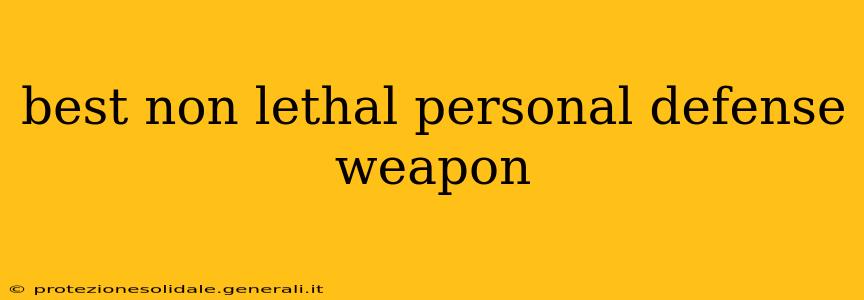Choosing the best non-lethal personal defense weapon is a critical decision, demanding careful consideration of your individual circumstances, legal limitations, and comfort level. There's no single "best" option, as effectiveness depends on various factors including the attacker's size and aggression, your physical capabilities, and the environment. This guide will explore several popular choices, address common concerns, and help you make an informed decision.
What Makes a Good Non-Lethal Self-Defense Weapon?
A truly effective non-lethal self-defense tool should meet several criteria:
- Ease of Use: It should be intuitive and easy to deploy quickly, even under extreme stress.
- Reliability: It must function consistently and as intended.
- Legality: Its use must be legal in your area. Laws vary significantly by jurisdiction, so check local ordinances before purchasing any self-defense tool.
- Effectiveness: It must offer a reasonable chance of deterring or incapacitating an attacker without causing serious injury.
- Portability: It should be easily carried and concealed, if necessary, without compromising safety.
Types of Non-Lethal Self-Defense Weapons
Several options exist within the realm of non-lethal self-defense. Let's examine some of the most popular:
Pepper Spray (OC Spray):
Pepper spray is a widely used and relatively effective non-lethal self-defense tool. It causes temporary incapacitation through intense burning and irritation of the eyes, skin, and respiratory system. It’s easy to use and relatively compact.
Pros: Easy to carry, widely available, effective against multiple attackers. Cons: Can be affected by wind, requires accurate aiming, may not be effective against individuals under the influence of drugs or alcohol.
Personal Alarms:
Personal alarms are simple devices that emit a loud, piercing sound to attract attention and deter attackers. They're inexpensive and easy to use, making them a good option for anyone, regardless of physical strength or training.
Pros: Lightweight, inexpensive, easy to carry. Cons: Relies on attracting attention from others, may not be effective against determined attackers.
Stun Guns:
Stun guns deliver a high-voltage, low-amperage shock that temporarily incapacitates an attacker. They are generally effective but require close-range contact and careful aiming.
Pros: Can quickly incapacitate an attacker. Cons: Requires close proximity, legality varies by location, effectiveness can be reduced by clothing.
Tactical Pens:
Tactical pens are designed with a weighted, durable body that can be used as a striking tool in self-defense. They offer a less conspicuous option compared to other self-defense tools, blending in seamlessly as everyday carry items.
Pros: Discreet, legal to carry in most jurisdictions. Cons: Requires training and proper technique for effective use.
Kubotan:
A Kubotan is a small, cylindrical self-defense weapon, often made from metal or hard plastic. It is used to strike pressure points on the attacker’s body. It requires some training to use effectively.
Pros: Small and easily concealed, can be used effectively against pressure points. Cons: Requires training to use correctly, less effective against multiple attackers.
H2: What is the most effective non-lethal self-defense weapon?
There’s no single "most effective" weapon. Effectiveness depends heavily on the user's skill, the situation, and the attacker's characteristics. Pepper spray is often cited for its broad effectiveness, while stun guns offer quicker incapacitation but require closer range. The best option for you depends on your individual needs and comfort level.
H2: Are non-lethal weapons legal everywhere?
No. Laws regarding non-lethal self-defense weapons vary significantly by jurisdiction. Some states or cities may restrict or ban certain weapons entirely. Always check your local laws before purchasing or carrying any self-defense tool.
H2: How can I improve my chances of successfully using a non-lethal weapon?
Proper training is crucial. Consider taking a self-defense course to learn effective techniques for using your chosen weapon and de-escalating potentially violent situations. Familiarize yourself with the legal ramifications of using a self-defense weapon in your jurisdiction.
H2: What should I do after using a non-lethal self-defense weapon?
Immediately call emergency services (911 or your local equivalent). Remain at the scene, providing information to law enforcement as needed. Seek medical attention if you've been injured. Document the incident with photos and witness statements, if possible.
Disclaimer: This information is for educational purposes only and should not be considered legal or medical advice. Always consult with a qualified professional before making any decisions related to self-defense. The legality and effectiveness of self-defense tools can vary depending on location, circumstances, and individual skill.
